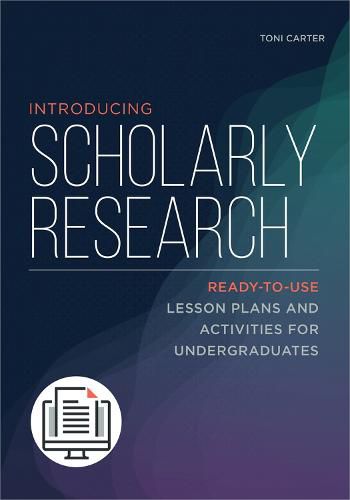Readings Newsletter
Become a Readings Member to make your shopping experience even easier.
Sign in or sign up for free!
You’re not far away from qualifying for FREE standard shipping within Australia
You’ve qualified for FREE standard shipping within Australia
The cart is loading…






This title is printed to order. This book may have been self-published. If so, we cannot guarantee the quality of the content. In the main most books will have gone through the editing process however some may not. We therefore suggest that you be aware of this before ordering this book. If in doubt check either the author or publisher’s details as we are unable to accept any returns unless they are faulty. Please contact us if you have any questions.
From this book, instruction librarians will gain strategies and practical tools for introducing undergraduates to scholarly research topics such as research ethics, the role of research in higher education, quantitative and qualitative methods, and research in the areas of STEM, Humanities, and Social Sciences.
The world of scholarly research is uncharted territory for undergrads, but with the right approach you can quickly get them up to speed. With 33 time-saving lesson plans, Carter’s invaluable resource will assist you in moving your instruction beyond basic skills to include how to use a library database and the reasons scholars use them to explaining why peer review is important. Inside, you’ll find
modular lessons designed for 50-minute timeslots that include individual and group activities with 25 worksheets, quick in-session assessment, conversation starters, and learning outcomes; a variety of mix-and-match tools and activities that can be easily adapted for one-shots; concepts that are grounded in the ACRL Framework for Information Literacy for Higher Education; topics that include the infrastructure that supports the scholarly research process; warm-ups using the lingo of favorite hobbies to launch a discussion of scholarship terminology; an exercise that brainstorms the factors leading to authority, then asks students to apply them to a well-known campus professor; an activity using visualization to examine the characteristics of a scholar to check biases and explore diversity; factors to consider when choosing a scholarly journal for publishing research; QUAN and QUAL worksheets to teach the two type of research; and discussion on the categories, disciplines, and crossovers within liberal arts.
$9.00 standard shipping within Australia
FREE standard shipping within Australia for orders over $100.00
Express & International shipping calculated at checkout
This title is printed to order. This book may have been self-published. If so, we cannot guarantee the quality of the content. In the main most books will have gone through the editing process however some may not. We therefore suggest that you be aware of this before ordering this book. If in doubt check either the author or publisher’s details as we are unable to accept any returns unless they are faulty. Please contact us if you have any questions.
From this book, instruction librarians will gain strategies and practical tools for introducing undergraduates to scholarly research topics such as research ethics, the role of research in higher education, quantitative and qualitative methods, and research in the areas of STEM, Humanities, and Social Sciences.
The world of scholarly research is uncharted territory for undergrads, but with the right approach you can quickly get them up to speed. With 33 time-saving lesson plans, Carter’s invaluable resource will assist you in moving your instruction beyond basic skills to include how to use a library database and the reasons scholars use them to explaining why peer review is important. Inside, you’ll find
modular lessons designed for 50-minute timeslots that include individual and group activities with 25 worksheets, quick in-session assessment, conversation starters, and learning outcomes; a variety of mix-and-match tools and activities that can be easily adapted for one-shots; concepts that are grounded in the ACRL Framework for Information Literacy for Higher Education; topics that include the infrastructure that supports the scholarly research process; warm-ups using the lingo of favorite hobbies to launch a discussion of scholarship terminology; an exercise that brainstorms the factors leading to authority, then asks students to apply them to a well-known campus professor; an activity using visualization to examine the characteristics of a scholar to check biases and explore diversity; factors to consider when choosing a scholarly journal for publishing research; QUAN and QUAL worksheets to teach the two type of research; and discussion on the categories, disciplines, and crossovers within liberal arts.